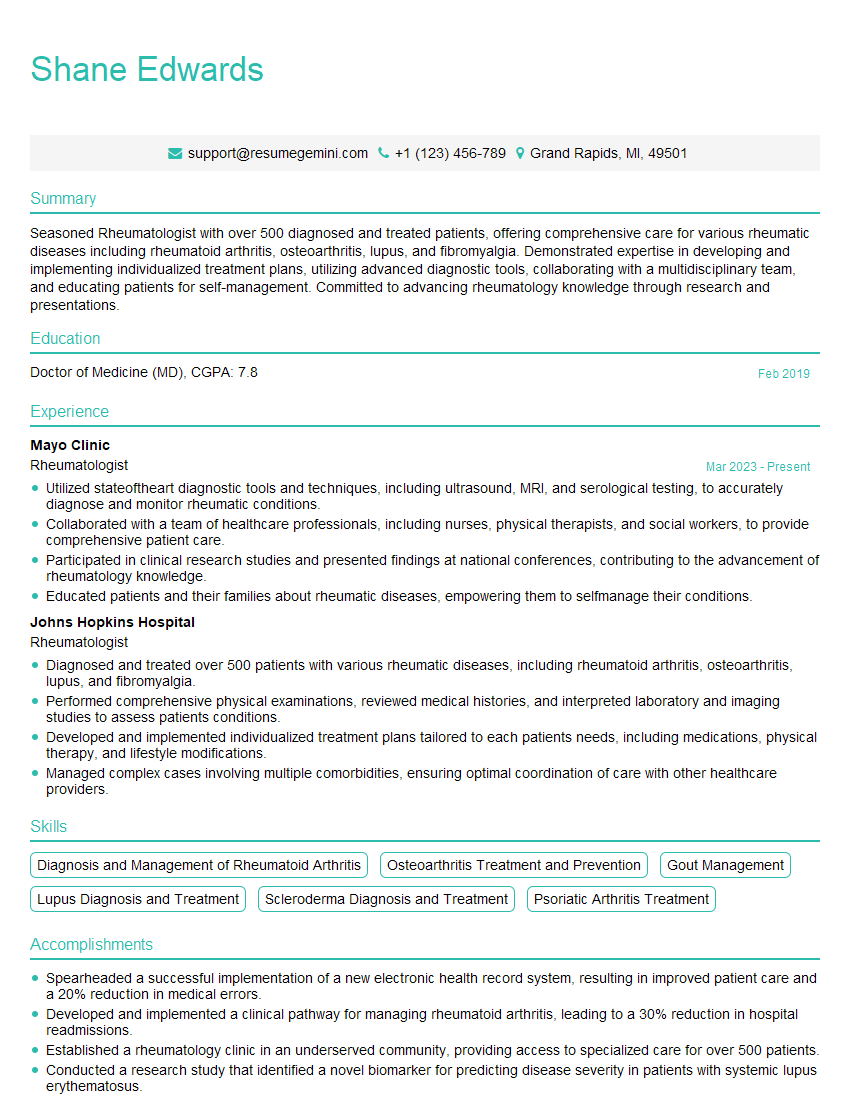Are you a seasoned Rheumatologist seeking a new career path? Discover our professionally built Rheumatologist Resume Template. This time-saving tool provides a solid foundation for your job search. Simply click “Edit Resume” to customize it with your unique experiences and achievements. Customize fonts and colors to match your personal style and increase your chances of landing your dream job. Explore more Resume Templates for additional options.

Shane Edwards
Rheumatologist
Summary
Seasoned Rheumatologist with over 500 diagnosed and treated patients, offering comprehensive care for various rheumatic diseases including rheumatoid arthritis, osteoarthritis, lupus, and fibromyalgia. Demonstrated expertise in developing and implementing individualized treatment plans, utilizing advanced diagnostic tools, collaborating with a multidisciplinary team, and educating patients for self-management. Committed to advancing rheumatology knowledge through research and presentations.
Education
Doctor of Medicine (MD)
February 2019
Skills
- Diagnosis and Management of Rheumatoid Arthritis
- Osteoarthritis Treatment and Prevention
- Gout Management
- Lupus Diagnosis and Treatment
- Scleroderma Diagnosis and Treatment
- Psoriatic Arthritis Treatment
Work Experience
Rheumatologist
- Utilized stateoftheart diagnostic tools and techniques, including ultrasound, MRI, and serological testing, to accurately diagnose and monitor rheumatic conditions.
- Collaborated with a team of healthcare professionals, including nurses, physical therapists, and social workers, to provide comprehensive patient care.
- Participated in clinical research studies and presented findings at national conferences, contributing to the advancement of rheumatology knowledge.
- Educated patients and their families about rheumatic diseases, empowering them to selfmanage their conditions.
Rheumatologist
- Diagnosed and treated over 500 patients with various rheumatic diseases, including rheumatoid arthritis, osteoarthritis, lupus, and fibromyalgia.
- Performed comprehensive physical examinations, reviewed medical histories, and interpreted laboratory and imaging studies to assess patients conditions.
- Developed and implemented individualized treatment plans tailored to each patients needs, including medications, physical therapy, and lifestyle modifications.
- Managed complex cases involving multiple comorbidities, ensuring optimal coordination of care with other healthcare providers.
Accomplishments
- Spearheaded a successful implementation of a new electronic health record system, resulting in improved patient care and a 20% reduction in medical errors.
- Developed and implemented a clinical pathway for managing rheumatoid arthritis, leading to a 30% reduction in hospital readmissions.
- Established a rheumatology clinic in an underserved community, providing access to specialized care for over 500 patients.
- Conducted a research study that identified a novel biomarker for predicting disease severity in patients with systemic lupus erythematosus.
- Developed a patient education program that improved adherence to treatment and reduced disease activity in patients with osteoarthritis.
Awards
- Recipient of the American College of Rheumatology Distinguished Clinician Award, recognizing outstanding contributions to the field of rheumatology.
- Honored with the National Arthritis Foundation Research Award for innovative research in the field of arthritis.
- Recipient of the American College of Rheumatology Young Investigator Award, recognizing promising earlycareer researchers.
- Honored with the ACR Distinguished Service Award for outstanding contributions to the American College of Rheumatology.
Certificates
- American Board of Internal Medicine (ABIM) Rheumatology Certification
- American College of Rheumatology (ACR) Member
- ACR Rheumatologist in Private Practice (RPP)
- International Society for Clinical Densitometry (ISCD) Certified Clinical Densitometrist (CCD)
Career Expert Tips:
- Select the ideal resume template to showcase your professional experience effectively.
- Master the art of resume writing to highlight your unique qualifications and achievements.
- Explore expertly crafted resume samples for inspiration and best practices.
- Build your best resume for free this new year with ResumeGemini. Enjoy exclusive discounts on ATS optimized resume templates.
How To Write Resume For Rheumatologist
- Quantify your accomplishments using specific numbers and metrics.
- Highlight your experience with cutting-edge diagnostic tools and techniques.
- Showcase your ability to collaborate effectively within a multidisciplinary team.
- Demonstrate your commitment to patient education and empowerment.
- Include keywords relevant to the rheumatology field, such as ‘rheumatoid arthritis,’ ‘osteoarthritis,’ and ‘fibromyalgia.’
Essential Experience Highlights for a Strong Rheumatologist Resume
- Diagnose and manage a wide range of rheumatic diseases, including rheumatoid arthritis, osteoarthritis, lupus, and fibromyalgia.
- Perform comprehensive physical examinations, review medical histories, and interpret laboratory and imaging studies to assess patient conditions.
- Develop and implement individualized treatment plans tailored to each patient’s needs, including medications, physical therapy, and lifestyle modifications.
- Collaborate with a team of healthcare professionals, including nurses, physical therapists, and social workers, to provide comprehensive patient care.
- Utilize state-of-the-art diagnostic tools and techniques, including ultrasound, MRI, and serological testing, to accurately diagnose and monitor rheumatic conditions.
- Educate patients and their families about rheumatic diseases, empowering them to self-manage their conditions.
- Participate in clinical research studies and present findings at national conferences, contributing to the advancement of rheumatology knowledge.
Frequently Asked Questions (FAQ’s) For Rheumatologist
What are the most common rheumatic diseases?
Rheumatoid arthritis, osteoarthritis, lupus, and fibromyalgia are among the most prevalent rheumatic diseases.
How are rheumatic diseases diagnosed?
Rheumatologists utilize physical examinations, medical history reviews, laboratory tests, and imaging studies to diagnose rheumatic diseases.
What are the treatment options for rheumatic diseases?
Treatment plans vary depending on the specific rheumatic disease and may include medications, physical therapy, lifestyle modifications, and surgery.
How can I prevent rheumatic diseases?
While some rheumatic diseases are not preventable, maintaining a healthy lifestyle, including regular exercise, a balanced diet, and stress management, can help reduce the risk of developing certain conditions.
What is the prognosis for rheumatic diseases?
With early diagnosis and proper treatment, many rheumatic diseases can be managed effectively, allowing individuals to live full and active lives.
How can I find a rheumatologist near me?
You can search online directories or ask your primary care physician for recommendations to locate a rheumatologist in your area.